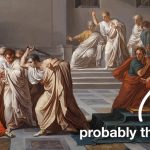Scene Study prepares you to perform key scenes for your theater class or audition. We've got all the information you need for a great performance.
Excerpt from Act 1 Dialogue: Lady Bracknell and Jack Worthing
|
Understanding the Given Circumstances
- Lady Bracknell has arrived for afternoon tea at her nephew Algernon Montcrieff’s apartment at Half Moon Street, West, an elegant neighborhood in Victorian London. Accompanying her is Gwendolen Fairfax, her only daughter, who is in love with Ernest Worthing, Algernon’s friend and guest at the tea.
- Both women are unaware that the men have created alternate identities to engage in fun and avoid social obligations. “Ernest Worthing” is actually the fictitious younger brother of Jack Worthing, who becomes “Ernest” when in London. Algernon creates “Bunbury,” an imaginary invalid who provides his excuse to visit the country.
- While Algernon and Lady Bracknell are in another room, Jack proposes to Gwendolen, who accepts.
- After Lady Bracknell learns of the proposal, she orders Gwendolen to wait in the carriage and proceeds to interrogate Jack on a number of topics regarding his suitability as a husband. Without Lady Bracknell’s approval, the marriage will not happen.
Blocking and Movement
In theater, blocking is the process of planning the actors’ physical movements and positions. Be sure to show respect and establish trust when working with scene partners. As you prepare to block this scene, ask yourself the following questions:
- Wilde describes the room as luxuriously furnished with afternoon tea ready on a table. Besides two chairs or a sofa and chair, what furniture is necessary for this scene? Where is the door that leads outside?
- Lady Bracknell has a small notebook and pencil. Are they in a pocket or a small handbag? What other hand props might Lady Bracknell use for emphasis? Does Jack have any props?
- Where is Lady Bracknell when she begins her interrogation? Where is Jack?
- Jack wants to make a good impression and responds honestly. Does he remain in place or move around the room? Does his physicality and line delivery display nervousness, thoughtfulness, or determination? How does this change during the scene? Does Jack keep his distance? Is there a point when he relaxes?
- Jack describes Lady Bracknell as “a monster without being a myth, which is rather unfair.” Self-serving with an excessive concern for appearances, she considers herself to be the expert on social etiquette and morality. What is her physicality? Are her gestures forceful, reserved, condescending, or something else?
- Until Lady Bracknell brings up parentage, Jack seems acceptable to her. Is she giving Jack one last chance, or does she come to a decision? How does this affect her attitude, speed of line delivery, and emphasis on keywords like “hand-bag?”
Historical Context
The British tradition of afternoon tea served as a perfect vehicle for The Importance of Being Earnest, Oscar Wilde’s subversive comedy of frivolous pursuits and questionable manners. With the advent of the Industrial Revolution and the invention of gas lighting, working hours could extend beyond sunset. For the upper classes, this meant the gentlemen could meet in their clubs during the afternoon, as dinnertime started fashionably at 8 p.m. Meanwhile, women endured growling stomachs until dinner. In 1840, Anna Maria Russell, the Duchess of Bedford, decided snacks were in order. She requested an afternoon tea, with bread-and-butter sandwiches and cake, around 5 p.m. Other ladies of the Court joined her, and soon Queen Victoria adopted the custom, as did others throughout her kingdom.
Afternoon tea allowed women to share ideas, discuss politics, show off new fashions, and catch up on the latest gossip. Arranged with only a few days’ notice, afternoon tea provided women a socially acceptable way to entertain mixed company without their husbands present. A proper afternoon tea enforced strict etiquette with witty conversation as entertainment. With expensive teas, porcelain cups, silver teapots, and fine linens, it became a way of showing wealth, culture, and often ostentation. Against this backdrop of upper-class gentility, Lady Bracknell found her calling as the self-appointed arbiter of social propriety and taste.
Full Act 1 Dialogue: Lady Bracknell and Jack Worthing
|













